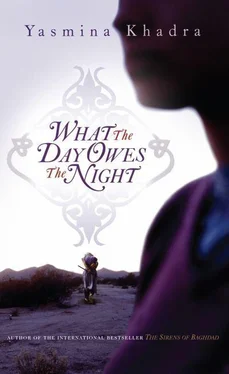‘Got it in one.’
‘I’m not God, and I’m not the republic. I don’t have the authority to recognise your people or to sympathise with your grief. I’m just a survivor who doesn’t know how he came through without a scratch when he was no better and no worse than those who died . . . If it’s any comfort, we’re all in the same boat. Webetrayed our martyrs, youbetrayed your ancestors, only to be betrayed in turn.’
‘I never betrayed anyone.’
‘You poor fool. Don’t you realise that one way or another, everyone who survives a war is a traitor?’
Krimo wants to wade in again, his mouth is twisted with rage, but Michel’s sudden reappearance stops him in his tracks. He looks me up and down, then steps aside to let me pass, and I walk down to where the car is parked next to a fairground.
‘Are you coming with us, Krimo?’ Michel asks him, opening the car door.
‘No, I’ll take a taxi.’
Michel does not insist.
‘Sorry about Krimo,’ Michel says as he starts the car.
‘Don’t worry about it. Am I going to get the same kind of welcome wherever we’re going?’
‘We’re going to my house. This might surprise you, but a couple of hours ago Krimo was jumping up and down he was so excited about seeing you again. He didn’t seem angry or upset. He flew in last night from Spain and spent all night laughing and joking about the good old days in Río Salado. I don’t know what got into him.’
‘He’ll get over it, and so will I.’
‘Probably for the best. My mother used to say that sensible people always make up in the end.’
‘Émilie used to say that?’
‘Yeah, why?’
I don’t answer.
‘How many children have you got, Monsieur Jonas?’
‘Two, a boy and a girl.’
‘Grandchildren?’
‘Five . . . the youngest – he’s getting married next week – was the champion diver in Algeria four years running. But my pride and joy is Norah, my granddaughter. She’s twenty-five and she runs one of the most important publishing houses in the country.’
Michel accelerates. We drive along the Route d’Avignon and stop at a red light; a sign points to Chemin Brunet and Michel takes it. The road winds steeply upwards, lined on either side by walls behind which are beautiful villas, glorious houses protected by high gates. The neighbour-hood is tranquil, radiant and burgeoning with flowers. In the street there is not a single child playing, only a handful of old people waiting in the shade of climbing vines for their bus.
The Benyamin house is on the brow of the hill, nestled in a grove of trees. It is a small white villa surrounded by ivy-covered walls. Michel presses a remote control and the gate opens automatically to reveal a large garden and, in the distance, three men sitting at a patio table.
I clamber out. Two of the three old men get up. We stare at each other in silence. I recognise the taller man, one of my neighbours back in Río Salado, a little stooped now and bald, but I cannot remember his name. We were never very close; we’d say hello when we passed each other in the street, then promptly forget about each other. His father was stationmaster at the local train station. Next to him I recognise a man of about seventy – well preserved, with a determined chin and a high forehead – as Bruno, the young policeman who loved to strut about the village square, twirling his whistle around one finger. I am surprised to see him here; I’d heard he’d been killed in an OAS attack in Oran. He comes up to me and holds out his left hand – his right hand is a prosthesis.
‘Jonas . . . it’s a pleasure to see you again.’
‘It’s lovely to see you too, Bruno.’
The tall man also greets me, limply shaking my hand; he clearly feels self-conscious. I suppose we all do. In the car, I had been imagining a joyful reunion, wholehearted embraces, throaty laughs counterpointed by loud claps on the backs. I imagined myself hugging some, holding others at arm’s length so that I could look at them, hearing old nicknames, old jokes; slipping back into childhood as someone told a story, finally exorcising fears that had haunted us for years, keeping only those memories we cherished. But now that we are finally together, all in one place, a strange awkwardness drains all our enthusiasm and we stand, speechless, like children meeting for the first time who do not know how to start the conversation.
‘You don’t remember me, Jonas?’ the tall man asks.
‘Your name is on the tip of my tongue, but I remember you – you lived at number six, behind Madame Lambert. I can still see you climbing over her wall to pilfer from her orchard.’
‘It was hardly an orchard . . . just one big fig tree.’
‘It was an orchard. I live at number thirteen, and I still hear Madame Lambert yelling at kids scrumping fruit from her orchard.’
‘My God . . . all I remember is that big fig tree.’
‘Gustave!’ I shout, clicking my fingers. ‘Now I remember – Gustave Cusset, the class clown. Always showing off.’
Gustave bursts out laughing, pulls me to him and hugs me hard.
‘What about me?’ the third man asks, not getting up from the table. ‘Do you remember me? I never went out scrumping apples, and in class I was as obedient as a puppy.’
He has really aged – André J. Sosa, the braggart, the big shot of Río Salado, who used to fritter money away as fast as his father earned it. He is huge, obese even, his paunch hanging down to his knees; his braces barely hold it up. He’s bald now, his face barely recognisable through the creases and the wrinkles. He smiles, showing a perfect set of false teeth.
‘Dédé!’
‘That’s me,’ he says. ‘An immortal, like they say about those old codgers in the Académie Française.’
He pushes his wheelchair towards me.
‘I can walk,’ he insists. ‘I’m just a little heavy . . .’
We throw our arms around each other and the tears that were misting our eyes begin to trickle down; we do not even try to stop them. We cry, we laugh, we slap each other on the back.
Evening surprises us, still sitting at the table, laughing and hacking hard enough to cough up our lungs. Krimo, who arrived an hour ago, is no longer angry with me. He said all he had to say at the cemetery; he is sitting facing me, feeling guilty about the things we said to each other, but he has the tranquil air of someone who has come to terms with things. It was a long time before he dared to look up at me. That done, he joins in our tales of Río Salado, about the end-of-season balls, the grape harvests, camping out in the moonlight, the drinking sessions and getting our leg over afterwards, about Pépé Rucillio and his secret escapades; not once does he recall anything unpleasant, any painful memory.
Michel’s wife Martine, a strapping woman from Aoulef, half Berber, half Breton, whips up a bouillabaisse of gargantuan proportions. The rouilleis delicious and the fish tender.
‘You still don’t drink?’ Dédé asks me.
‘Not a drop.’
‘You don’t know what you’re missing.’
‘If only that was allI was missing.’
He pours himself a glass, looks at it, and knocks it back in one.
‘Is it true there’s no wine-making in Río Salado any more?’
‘It’s true.’
‘Fuck . . . what a waste. I swear there are times when I can still taste that glorious wine we used to make, Alicante d’El Maleh; it made us want to drink and drink until we couldn’t tell a pumpkin from an old woman’s arse.’
‘The agricultural revolution ripped out all the vineyards in the area.’
‘What did they plant instead?’ Gustave asked indignantly. ‘Potatoes?’
André moves the bottle standing on the table between us.
Читать дальше












